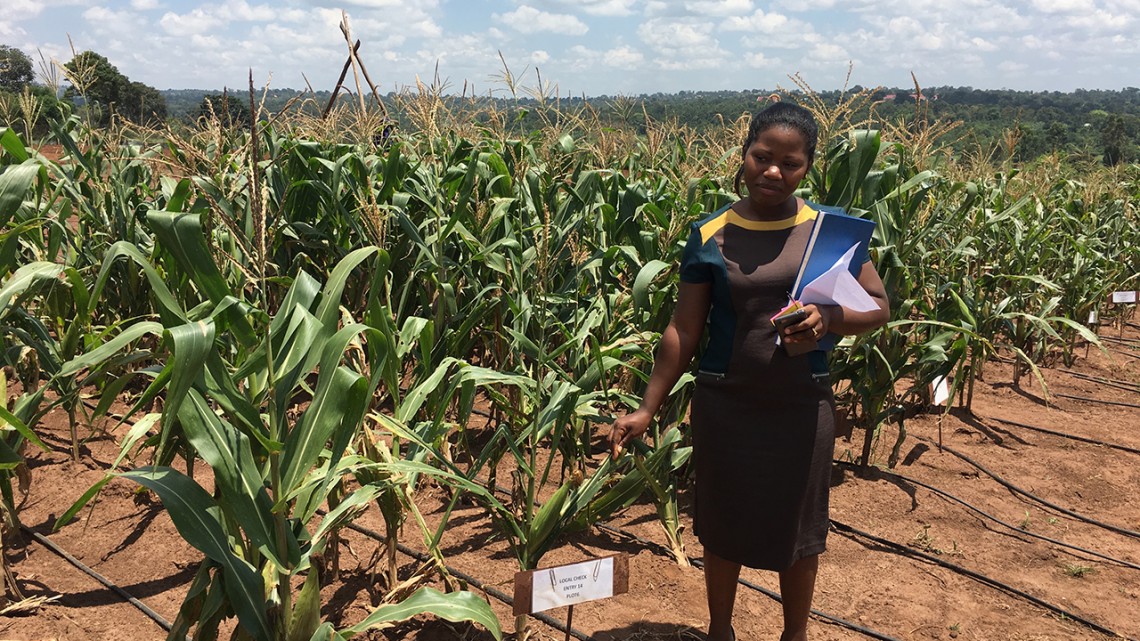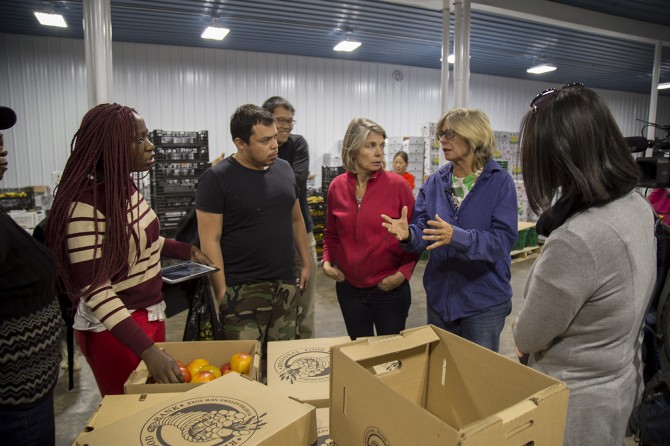
Winnie Nanteza, a 2018 Cornell Alliance for Science Global Leadership Fellow from Uganda, shows journalists a plot of genetically modified corn at the research facility where she works.
International leaders in science, agriculture, justice arrive Aug. 27
By Joan Conrow
Communicators, farmers, scientists, youth leaders and agricultural experts are among those participating in the 2018 Cornell Alliance for Science Global Leadership Fellows Program, beginning Aug. 27. The 27 fellows are traveling from Africa and the Philippines to attend the 12-week intensive training program on Cornell’s Ithaca campus.
“The fellows are an integral part of our mission to create a global network of science champions who are dedicated to helping small-holder farmers, reducing poverty and eliminating hunger,” said Sarah Evanega, Ph.D. ’09, director of the Cornell Alliance for Science and adjunct international professor of plant breeding and genetics. The network has partners on six continents.
“The Alliance for Science’s mission to educate the public and policymakers about agricultural technology is crucial if we are to successfully feed the world’s growing population in the 21st century,” said Kathryn J. Boor '80, the Ronald P. Lynch Dean of the College of Agriculture and Life Sciences, which houses the Alliance.
The 2018 cohort includes Ghanaian farmer Evans Okomeng, who characterizes his country’s delay in adopting genetically modified crops as “an injustice to the ordinary farmer,” and Winnie Nanteza, who has conducted extensive public outreach around biotech crops as development communication officer with the National Crops Resources Research Institute-Uganda.
Many 2018 fellows are also staunch proponents of environmental sustainability and social justice, including Chidi Okereke, who advocates for human rights, gender equality and youth participation in governance in Nigeria, and Taikee Calleja, who believes the Philippines can make development progress without sacrificing the nation’s ecology by taking advantage of new technologies.
Others, like Louis Juma Baraka of Tanzania and Okon Odiong Unung of Nigeria, are working directly with farmers. Some, such as Veronica Zulu Mwaba of Zimbabwe and Verenardo Meeme of Kenya, are active in promoting effective science communication.
“We are thrilled to be welcoming such an engaged, talented and dedicated group of fellows,” said Polly Endreny Holmberg, who leads the Global Leadership Fellows Program (GLFP) and other short-course training programs for the Alliance.
The GLFP – now training its third cohort – is designed to build the skills of emerging international leaders who are committed to advocating for access to agricultural innovation in their home countries. The course includes training in strategic planning, grassroots organizing, the science of crop biotechnology and effective communications.
Upon completion of this certificate program, fellows become members of an international professional network qualified to promote evidence-based decision-making about food security, agricultural development, environmental sustainability and climate change.
The program graduated 28 fellows in 2016 and 25 fellows in 2015. They represent 20 countries across South and Southeast Asia, Latin America and sub-Saharan Africa, as well as the United States.
Alumni fellows have successfully launched activities in their home countries that support science education and expand public awareness of the role agricultural biotechnology can play in improving the lives of small-holder farmers and boosting food security. They have also worked to advance science-based policies related to agriculture in their own countries.
The GLFP is supported in part by the Bill & Melinda Gates Foundation and tax-deductible donations.
Joan Conrow is managing editor for Cornell Alliance for Science.
Media Contact
Get Cornell news delivered right to your inbox.
Subscribe

